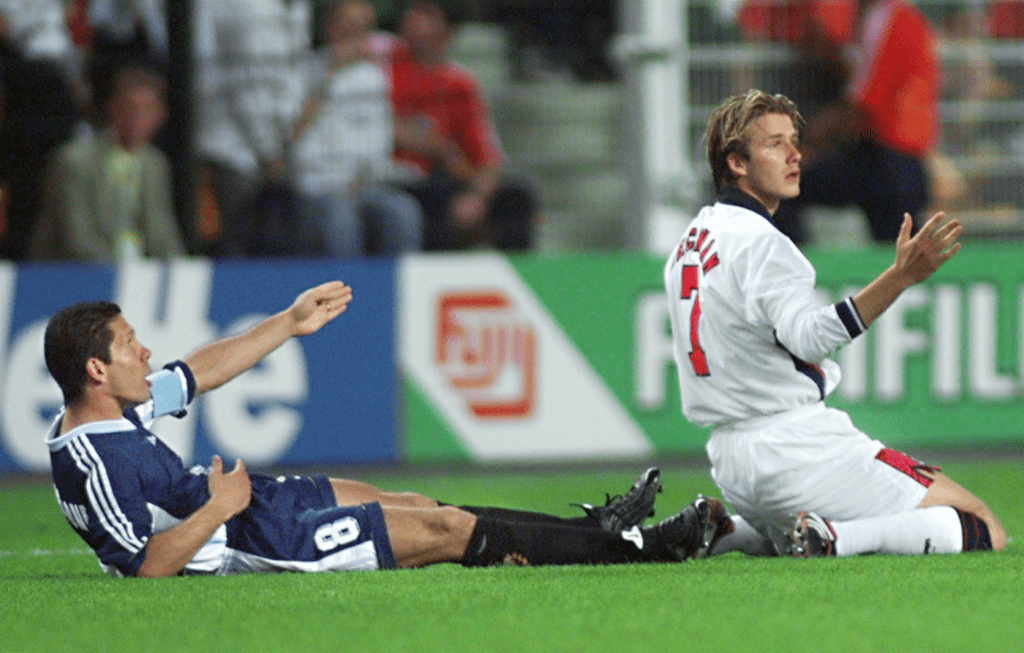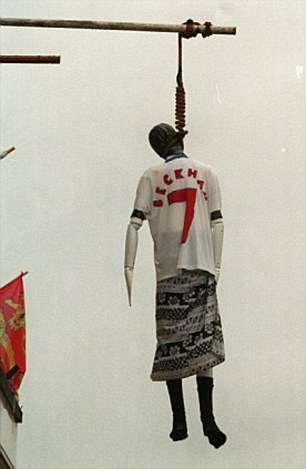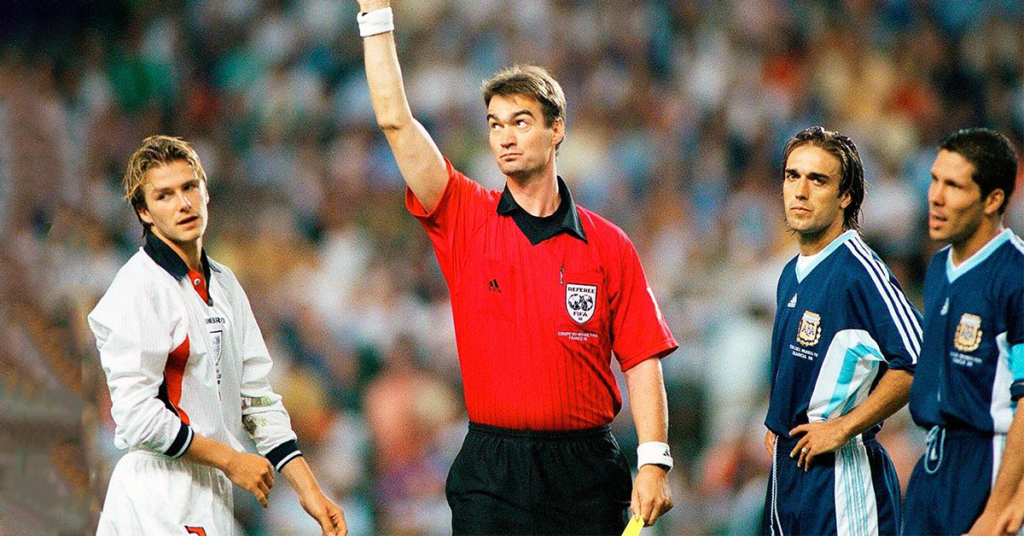David Beckham’s red card vs Argentina was a turning point in his career. The England turned from hero to villain in the blink of an eye, and became the most hated man in England in 1998.
However, he turned the perception around to become an England great and one of the best footballers in the world.
In this article, we will explore what happened in the 1998 World Cup, and how it affected David Beckham and how he came through the adversity to become one of the best footballers in the world.
David Beckham 1998

Who is David Beckham?
David Beckham is one of the biggest names in football history.
Alongside the likes of Pele, Ronaldo and Maradona, Beckham is known over the world for his work on the pitch.
Beckham wowed fans in Manchester, Madrid, LA, Milan and Paris in his career. He won league titles in three countries and lifted all there was to win with Manchester United.
David Beckham captained England to two World Cups, and was the villain in his third.
He narrowly missed out in 2010 aged 35, and made 115 appearances for his country.
He is fourth on the list of most caps as captain, behind legends Billy Meredith, Bobby Robson and Bobby Moore. Beckham was part of the England Golden Generation of players, who should have won more.
A legend such as Beckham has a number of years in which you could class as his finest.
His final year at Madrid had the club begging for him to tear up his LA Galaxy deal and stay with Los Blancos.
At 40 years old, he helped PSG win Ligue 1. In 1996, he played 33 times as United won their famous double, inspired by Eric Cantona.
1999 was the best year of his carer. He won the treble with Manchester United and finished second in the vote for the Ballon d’or.
But 1998 was the year to forget. The stage was set for David Beckham at the 1998 World Cup, but the Argentina side had other ideas.
1998 World Cup
David Beckham was already a seasoned professional by the time the 1998 World cup came along.
He went to France as a Premier League champion, having missed just a single game in the 1997/98 season. He also played every minute of the World Cup qualifiers.
Glenn Hoddle’s England went into the tournament hopeful of a decent run, especially after the semi final heartache of Euro 1996.
England topped their qualifying group for the World Cup.
Despite losing to Italy at the old Wembley, thanks to a goal by Gianfranco Zola, they finished a point ahead of the Azzurri thanks to a 0-0 draw in Rome.
Alan Shearer finished top scorer of their group, and there was excitement to see just what this England side could do in France.
The Group Stage
However, despite a strong season, Beckham was on the bench for the opening two games.
Darren Anderton took his place on the wing, as England cruised to a 2-0 win over Tunisia.
However, after a shock defeat to Romania, who topped the group, Beckham was drafted back in for the final group game against Colombia.
Beckham scored a wonderful free kick from 30 yards after Anderton opened the scoring, and helped England progress by coming second in their group.
They progressed into the knockout stages, and faced Argentina.
England vs Argentina
There had been bad bloody between the two nations over the past 25 years.
The Falklands War set the tension between the teams, and the flames were fanned by Diego Maradona’s double against the Three Lions in 1986.
One of his goals was one of the greatest of all time, dancing around the England defence before slotting past Peter Shilton.
The second, a handball that saw him outjumped the goalkeeper and punch the ball into the net. Dubbed “The Hand of God” by Maradona after the game, it became one of, if not THE most, famous goal of all time.
This game was not devoid of the controversy that made 1986 infamous.
The game finished 2-2 after extra time and went to penalties. The game itself had penalties awarded in the first 10 minutes, with both teams scoring one apiece.
Michael Owen took the lead 6 minutes later with an incredible solo goal, which thrust the 18 year old into the world spotlight.
Javier Zanetti fired home the equaliser just before half time, and the teams went in at 2-2
Beckham sees Red
The game was one filled with fouls and dirty play.
David Beckham was being hounded by Argentina player Diego Simeone, who is now Atletico Madrid boss, all game.
Unleashing his frustration, he kicked out at the Argentine midfielder 2 minutes into the second half, and was shown the red card for his indiscretion.
The kick was a tame one, and one not worthy of a red card in itself. But of course the ref had no choice but to send off the England man, who was instantly vilified by the supporters at home.
England held on for another 45 minutes, plus extra time.
England withheld the Argentina barrage for the rest of the game. It was backs to the wall defending, with David Seaman pulling out save after save to deny Argentina. The defence held strong, and even almost won the game at the
other end.
Sol Campbell headed in from a corner, seemingly winning the match for Hoddle’s side and condemning the Argentinians to defeat.
However, the goal was ruled out for an alleged push on the goalkeeper. To this day, England fans believe this was a ridiculous call, and the Argentinians back the referee to the hilt.
Penalty Shootout
The game would go to sudden death. Just like two years prior, the game went down to penalty kicks. With the ghosts of Euro 1996 still clouding the minds of England, things seemed like the end for England.
After 8 penalties, the scores were tied at 3-3. David Batty, the Newcastle United midfielder, stepped up to the take his penalty.
Batty only scored 8 goals in his career, so was an odd choice for such a crucial penalty.
“Do you back him to score? Quickly Kevin, yes or no” Commentator Brian Moore asked his co-commentator, former Ballon D’or winner Kevin Keegan.
“Yes” Keegan blurted out, as the penalty is saved by Argentina’s Carlos Roa.
The line has been immortalised in the public perception, including inspiring the 1990s themed football podcast “Quickly Kevin, will he score“,
Argentina won, and David Beckham was a national disgrace
Beckham’s Failure
After England crashed out of the World Cup, all the blame turned to David Beckham.
The Manchester United winger was the perfect scapegoat. His high profile lifestyle meant media scrutiny was at an all time high. Beckham was engaged to Spice Girl’s singer Victoria Adams and was the star of an unstoppable Manchester United side.
He had already been scrutinised for his lack of discipline early in his career.
David Beckham was the first England player to receive two red cards – once against Argentina in 1998, and Albania in 2005. Beckham was also the first England captain to be sent off in that Albania match.
He was known for his rash tackles which caused him to pick up unnecessary bookings.
The Englishman received an average of a booking ever 6 games at Manchester United, and was known to kick out at opponents at times.
However, his team mates argued that he was punished more so for his profile and “good looks”, having more attention drawn to his actions due to his profile.
“I don’t know why Beckham got sent off” Former Real Madrid team mate Pablo Garcia said in 2005,. “Maybe it’s because he’s blonde and pretty – the referee is capable of sending him off for that.”
The Aftermath
“Beck Home” and “10 Heroic Lions, One Stupid Boy” adorned the tabloid front pages. Beckham was vilified as the villain of the piece, and became hated across the nation.


Angry fans hung effigies on lamp posts, wearing Beckham shirts and the infamous sarong. They were burnt, defiled and England fans across the nation made him enemy number one in the nation. He received death threats and even bullets in the post.
It was a shameful display from the English fans and press, turning on one of the stars of the team due to a moment of madness. There is no telling if they would have won the game if he’d have kept his cool
Beckham himself claims that Glen Hoddle has his part to play in the media frenzy surrounding his red card.
“He didn’t blame me, exactly, but he made it clear that he thought that my mistake cost England the game.” Beckham said in a 2013 interview, “He showed his anger and irritation with me. It definitely fed the frenzy”.
The first away match next season was at West Ham, with the Hammers fans apoplectic in their hatred for the Manchester United winger.
He needed an armed guard to escort him off the pitch, to avoid the vitriolic threat spat toward him from irate West Ham supporters.
It was one of the most disgusting treatment of a player in England in years, and one would not have blamed Beckham for moving abroad years earlier than he did.
Beckham’s reaction
Lesser players would have cowered in fear. Lesser men would have had their international career be over and collapsed under the weight of the abuse received.
But Beckham ploughed through.
The divide between club and country had been growing larger at Manchester United.
Many Manchester United fans considered themselves supporters of their club over their country.
They did not care what had happened in France against Argentina, as long as Beckham kept performing for his club side.
What came next was the best season of his career.
The Treble
He was a rock on the right hand side for Manchester United in their best season ever. His partnership down the right hand side with Gary Neville was telepathic, with their overlaps a joy to watch.
His deep crosses into Andy Cole and Dwight Yorke were pin point accurate, and his free kicks were deadly at any range.
He played 34 league matches in their title winning campaign, notching 6 goals and 9 assists.
His influence however was unquantifiable, and earned him plaudits as one of the best players in the word.
He played outside of his normal position in the 1999 Champions League Final. He partnered Nicky Butt in central midfield due to the suspensions of Paul Scholes and Roy Keane.
Beckham’s influence on the result was clear. He sent in the two corners that led to Sherringham to equalise, and Solskjaer to score the winner.
It led to United’s historic treble, a feat which no English team has matched before or since.
He finished second behind Ronaldo in the Ballon D’or that year, and took his seat amongst the table of the world elite of football.
It’s hard to say the impact Argentina had on David Beckham. Some could say that it brought the best out of him.
Other could argue it showed he had the willpower to get through any situation, regardless of 1998.
All we know is that Beckham followed up that hardship with one of the greatest seasons in Premier League history.
